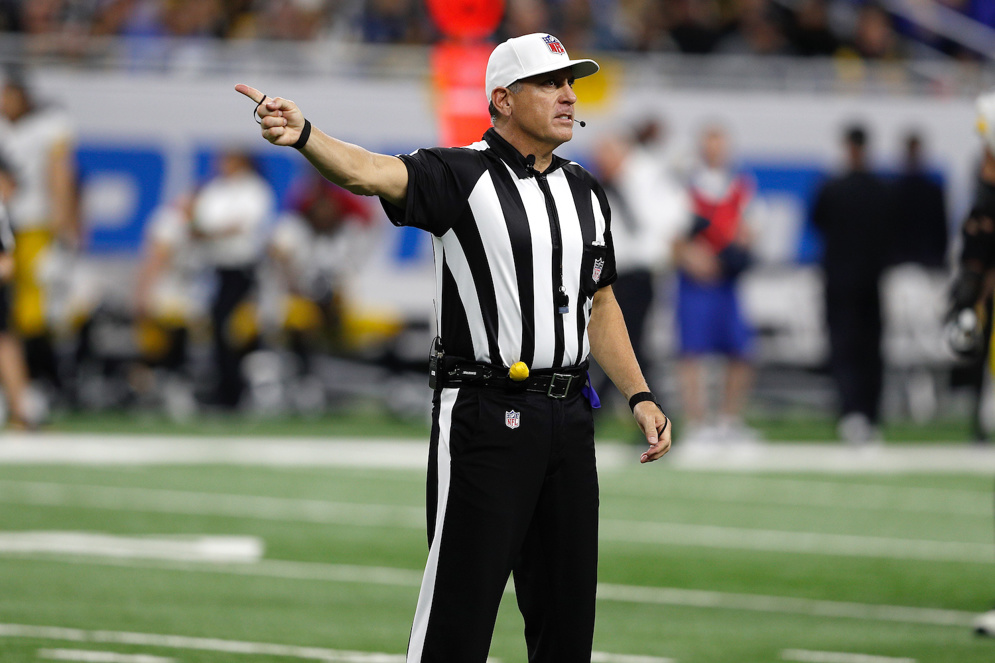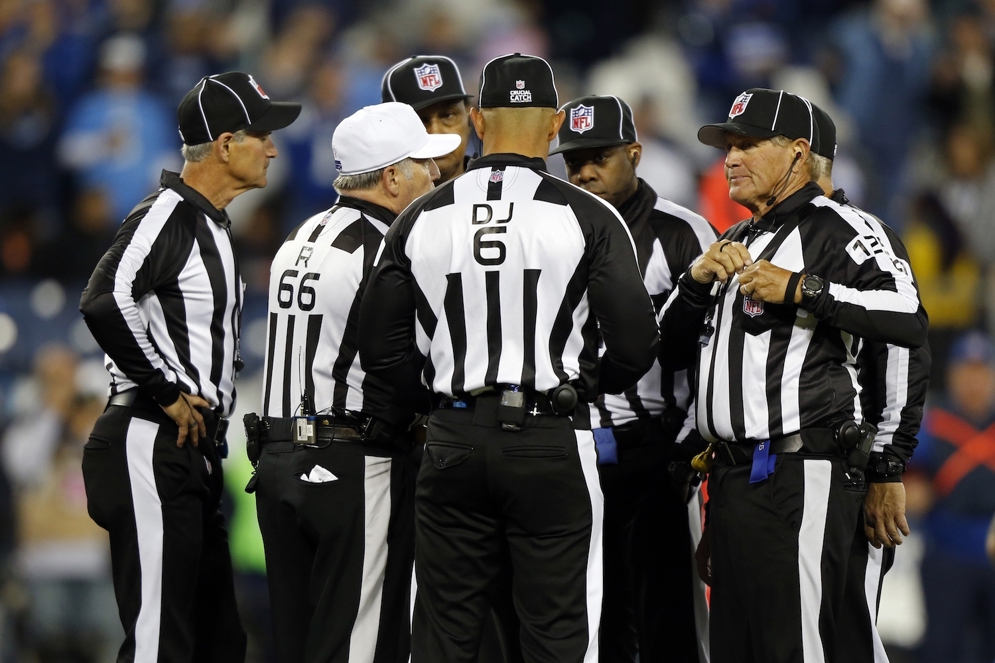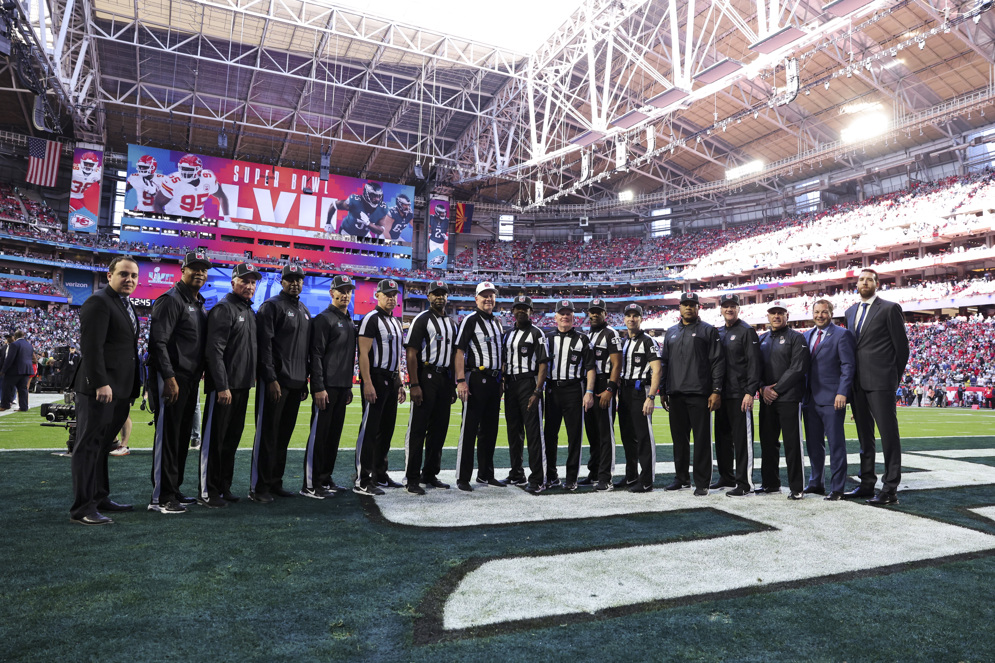NFL Officials: Preparing for Success
Every week, officials take the field ready to put months of preparation, training and hard work on display, knowing that the whole world — and the Officiating Department — is watching.
Every week, officials take the field ready to put months of preparation, training and hard work on display, knowing that the whole world — and the Officiating Department — is watching.
Each game averages about 153 plays, so a typical official who works 14 regular-season games is evaluated on nearly 2,200 plays in a single season. The Officiating Department reviews game footage looking for the calls that were made correctly — and also the ones that were missed.
There is nowhere to hide on the football field. Whether working a closely contested Super Bowl or the final minutes of a preseason game, officials are expected to exhibit the same high level of excellence on every play.
They are carefully selected, extensively prepared and rigorously evaluated to ensure that they call games correctly and consistently. This process results in the outstanding officiating that players, coaches and fans expect and deserve.
Officiating an NFL game — making split-second decisions at full speed and at field level — takes decades of work and dedication. While fans may not always agree with every call, one thing is certain: These officials are good.
“If you were going to write a 10-chapter book about what it's like to be an official in the NFL, the first nine chapters would deal with preparation. The last chapter would deal with the game.” — Jerry Seeman, NFL Director of Officiating, 1991–2001
For NFL officials, on-field success depends on preparation.
While fans see officials only on gamedays, much more happens away from the field — even before the officials ever don the stripes in the NFL. Each season, the quest for officiating excellence begins before players report to training camps.

Referee John Hussey signals a penalty during an NFL game. (Scott Boehm via AP)
During the offseason, the NFL holds two clinics to get on the same page with its officials. The first focuses on new rules, physical assessments and administrative changes. The second features written exams, testing their knowledge of the rules, mechanics for their positions and on-field mobility. New rules and points of emphasis are thoroughly covered as officials prepare for any situation they may encounter on gameday.
An added emphasis on fitness keeps officials in shape for the growing physical demands of a game that gets faster every year: NFL offenses ran 150% more no-huddle plays in 2013 than in 2008, according to The Wall Street Journal. The league tests officials’ conditioning and agility to ensure that they can keep pace with the game’s best athletes.
Officials go to organized team activities (OTAs), minicamps and training camps, where they officiate practices and call preseason games to get into regular-season form. They prepare for these games as they would for the regular season, and they are evaluated the same way.
During the season, the final whistle of a game marks the beginning of preparation for the next week. Before leaving the stadium, each crew member gets a flash drive with the TV broadcast of the game that he or she just worked. Many review the video on the flight home.
"If you don't prepare 30 to 35 hours a week for those three hours on Sunday, then you cannot do your job effectively and you will not survive in the National Football League." — Alberto Riveron, Senior Vice President of Officiating, 2017-2020
NFL officials spend hours from one week to the next, breaking down video, getting ready for the next contest, and reviewing with crew members and supervisors what went right, what went wrong and what could be improved.

Officials gather during an NFL game. (AP Photo/Wade Payne)
Each crew chief uses game footage to scout the two teams that the crew will see in their next assignment. That information helps each official effectively prepare by identifying the formations, defenses and tendencies they can expect to see in the matchup.
Crews may even be notified about an unusual play one of the teams plans to run. Coaches occasionally send the officiating department video of a play they designed to make sure the formation or some other aspect of the play is legal. If it is, the officiating department will share the video and explanation with the game referee, so the officiating crew will not be caught unaware.
Officials use tablets to download and watch video of game situations between games. The tablets let them prepare for games anywhere, whether they are at home, on an airplane or in a hotel room.
On gamedays, officials emerge from the tunnel ready to put their preparation, training and hard work on display, knowing that the whole world — and the Officiating Department — is watching.
" In order to apply the rules correctly on Sundays, you have to be in the right place at the right time. That takes practice. That takes snaps. That takes a lot of film evaluation." — Alberto Riveron, Senior Vice President of Officiating, 2017-2020
The Officiating Department’s weekly evaluation process is thorough. They work with officiating supervisors to review every play from each of the seven on-field officiating positions: referee, umpire, down judge, line judge, field judge, side judge and back judge. The supervisors — former officials with decades of experience — identify successes, areas for improvement and points to emphasize.
See NFL officials' roles and responsibilities

Art McNally GameDay Central.
Officiating supervisors review one game in person each week. From a booth above the field, they observe the officials, focusing on positioning, mechanics, accuracy, professionalism and more. The review begins at the stadium, and supervisors will leave with a flash drive of the game so they can get a closer look. Depending on how many teams are in action in a given week, supervisors also may evaluate a second game. They’ll receive a hard drive with the additional footage from Art McNally GameDay Central and evaluate that game using the same strict criteria.
Officials receive their review early in the week and discuss them with the supervisors and their fellow crew members. Weekly training videos are distributed to every official to clarify the handling of specific calls. In the middle of the week, senior leaders from the Officiating Department hold calls with crews to go over specific plays.
All of this is done in pursuit of consistency across every officiating crew — from game to game and week to week.
"The key to officiating is learning to focus completely for eight seconds at a time, 160 times in a row." — 25-year NFL officiating veteran Mason “Red” Cashion
A typical 2023 NFL game averaged just over 153 plays — a number that has remained high in recent years as more teams run up-tempo offenses.
More plays create more chances for an official's call (or non-call) to be reviewed — and also increases the possibility of error.
Even on the toughest, most controversial calls that were elevated to instant replay review, an official’s initial ruling on the field is confirmed nearly two-thirds of the time.

Members of the Super Bowl LVII officiating crew. (AP/Ben Liebenberg)
The review process culminates when officiating crews are evaluated for the past season’s work, with rewards and consequences.
The top officials and crews each year receive the ultimate recognition in officiating: the privilege and responsibility of working an NFL playoff game. For some, decades of hard work and preparation pay off in a potentially once-in-a-lifetime Super Bowl or conference championship assignment.
For others, a subpar season-long performance could mean remediation, or even a demotion. NFL officials serve on a year-to-year contract, and they have to prove their mettle every year. There is no guarantee that they will return the next season.
The vast majority do succeed. Fortunately for the NFL, its players and its fans, these officials are good.